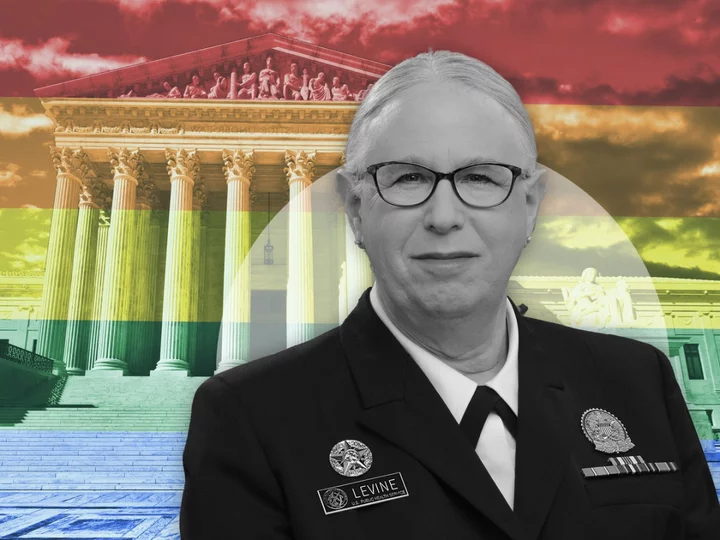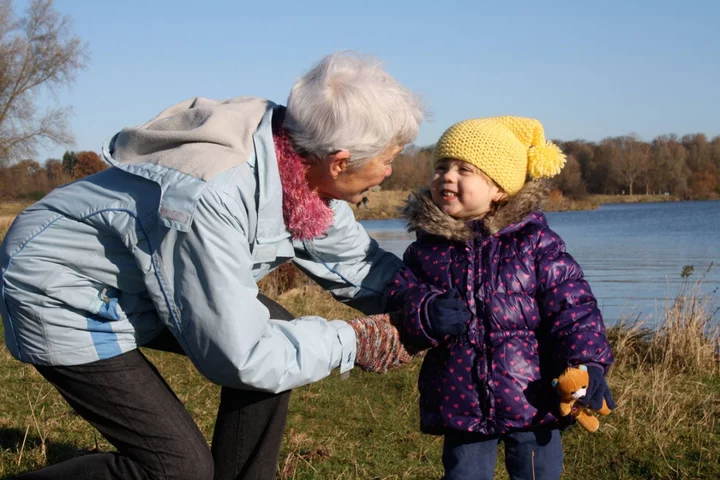
125,000 New York high school seniors will be automatically accepted to SUNY community colleges this fall, governor announces
About 125,000 New York high school students will receive a letter notifying them they've been automatically accepted to the State University of New York's community college programs, the state's governor announced Thursday.
2023-06-02 09:49

The 25 Best Children’s Books of All Time
The best children’s books of all time include works by J.R.R. Tolkien, Maurice Sendak, Louisa May Alcott, and more.
2023-06-02 04:28

Senate passes bill to block Biden's student loan forgiveness program
Both the Senate and the House have now passed a bill to block President Joe Biden's student loan forgiveness program, which promises to cancel up to $20,000 of debt for millions of borrowers but has been held up by courts.
2023-06-02 02:45

Scholars Have Released the First Words Chosen for The Oxford Dictionary of African American English
The years-in-the-making Oxford Dictionary of African American English will offer proper attribution to words and phrases that originated in Black culture.
2023-06-02 02:29

Rachel Levine on Congress bigots, Don’t Say Gay and life as Biden’s top trans official: ‘Despair doesn’t motivate change’
"I'm not the best person for hobbies," says Dr Rachel Levine. In her 40 years of practicing medicine, four of which were spent running the health department of the state of Pennsylvania, she has rarely had much time for recreation. Now she is not only the assistant secretary of state for health for the whole United States under president Joe Biden, but also the most senior openly transgender government official in American history. More than that, she has taken a strong line supporting trans children and transition healthcare at a time when they are under unprecedented attack. According to the non-profit Human Rights Campaign, 19 states have banned transition healthcare for under-18s, and eight more are considering doing so. Meanwhile, medics and patients – including at Boston Children's Hospital, which established the nation's first trans health programme for children and adolescents in 2007 – have received a storm of harassment and threats. "I know the people who developed that clinic. I know them all personally," says Levine, 65, who grew up in Massachusetts and still speaks with a touch of New England in her accent. "I remember when that clinic was formed... now it's under siege by people with political and ideological motivations. "So we need to support trans youth, we need to support their families and we need to support these expert providers that are providing this careful, intentional care according to well-established evidence-based standards." Levine is speaking to The Independent via Zoom from her office in Bethesda, Maryland, flanked by flags, her white hair tied tightly behind her head. As a four-star admiral in the US Public Health Service Commissioned Corps, she wears military-style blue overalls modeled on those of the US Navy and Coast Guard. She does not, she explains, consider herself to be a politician. She has never run for or been elected to office. Instead she sees herself as simply a doctor and a public servant, who now has a rare ability to advocate for her community, as well as overseeing public health areas raging from abortion rights through long Covid to the unequal impact of pollution and natural disasters. But politician or not, her identity has made her a lightning rod for criticism and, sometimes, viotriolic bigotry from anti-trans conservatives. Her name is a fixture in online extremist spaces, where her appointment is painted as part of a conspiracy to overturn traditional gender roles. "When I receive that pushback, I sublimate it," she says, using the psychological term for turning a negative mental energy towards useful ends. "I am a positive and optimistic person because I choose to be positive and optimistic. I can be pessimistic and in despair, but that doesn't motivate change." ‘Trans healthcare is medicine like any other’ Born in 1957, Levine attended an all-boy's school near Boston and studied medicine at Harvard and Tulane University, before completing her training at a hospital in New York City where she specialised in paediatrics and psychology. In 1993, in what she has called her wryly called "most difficult transition", she moved southwest to become a professor at the Penn State, a position she still holds today. In 2015, however, her life took a different turn when Pennsylvania's incoming Democratic governor Tom Wolf asked her to co-chair his health policy transition team and then to be his physician general – a job that would put her right in the merciless gaze of national politics and media. Four years earlier, after decades of "compartmentalising" her feelings, Levine had come out as a trans woman in her fifties. Yet although the backlash against trans rights was already in the offing, her appointment was unanimously confirmed by the state legislature, later becoming Pennsylvania's health secretary and leading its response to Covid-19. Her US Senate confirmation hearing in 2021 was another matter. Republican senator Rand Paul asked her whether children were capable of consenting to medical transition, falsely describing sex reassignment surgery as "genital mutilation". All 50 Democrats and two Republicans voted to confirm her, while the other 48 Republicans voted against. "My confirmation hearing was – interesting," says Levine now, with only the shortest pause, "but not unexpected, and so I was able to navigate that." She adds that although she doesn't deal frequently with Congress, most politicos have treated her "respectfully". As a paediatrician, Levine argues that treatments such as puberty blocking drugs and hormone replacement therapy (HRT) for under-18s should be treated just any other childhood medicine. (Breast removal surgery is rarely prescribed for trans teenagers, and never for younger children, while genital surgery for under-18s is almost unheard of). "Transgender care for youth is medical care; it is mental health care; it is literally suicide prevention care," says Levine. "And it is based upon a well-established standard of care which continually gets updated, as all standards of care do... "It always needs to be done carefully, usually with national or international standards, and then it's individualised to the patient and the family. That's how we do paediatric care. It is no different for transgender medicine." One supportive adult can make the difference Critics of medical transition sometimes liken gender dysphoria – that is, feelings of discomfort or horror related to one's gender – to eating disorders, arguing that both involve an irrational aversion to one's natural body. Levine, who is an expert on eating disorders, pooh-poohs that idea, saying the causes of and solutions to each condition are completely different. Although young trans people do have worse mental health on average than the US population, she says evidence shows that is not caused by being trans but by the way they are being treated by others – a problem exacerbated by anti-trans laws and rhetoric. "Young people who receive support and standard of care treatment have excellent mental health outcomes," she says. "They have depression and anxiety because they're being harassed and bullied, and they're not being allowed to transition. If you facilitate them being who they are, their mental health gets better." Nor is there any evidence, she says, for a theory widespread among anti-trans activists: that young people are being falsely persuaded that they are trans by "social contagion" from their peers. She describes an often-touted 2018 paper by medicine professor Lisa Littman, proposing that trans children may be suffering from "rapid onset gender dysphoria" (ROGD), as "flawed". A group of medical organisations including the American Psychological Association and the American Psychiatric has since warned against applying the concept of ROGD in clinical contexts, describing it as based on "unsupported claims" and likely to "stigmatise" trans people. Littman corrected her paper in 2019 after intense criticism of its methods, and the journal that published it issued an apology. "All the evidence really points to better communication and understanding about gender identity among young people, so that they understand who they are and they come out," says Levine. "There's a lexicon, there's a language, there's support. And more parents understand, and there has been more availability of treatment, and there still is availability of treatment." All of those are things Levine herself never had as a child. "I grew up in the Sixties and Seventies," she says. "There was no terminology, there was no internet, there was no Google. And so I did not understand the thoughts and feelings I was having about gender identity." Even though she had supportive adults in her life, she says there was no way to ask them about being trans because the concept was so unknown. "Who are you going to tell? And what would you have said? None of the language was there." Today she frequently touts a study by The Trevor Project, an American LGBT+ support charity, showing that having even one adult in their life who supports their gender identity can meaningfully lower a young trans person's likelihood of attempting suicide. It is why she is so concerned about Florida's so-called "Don't Say Gay" law and other similar laws, which ban teachers from discussing LGBT+ issues in public schools. "That one supportive adult might be a parent or a relative, but it might not," says Levine. "It might be a teacher, or a coach, or guidance counsellor, or someone else in the community that makes that difference... "[Florida's law] makes it so difficult for a young person to be able to talk to, potentially, that teacher or that coach or that guidance counsellor, because that person then has to immediately tell the young person's parents by that state law." While Republican state legislators seek to pass laws that would make it more difficult for trans people to get healthcare, work in education, or exist in public, a few figures have explicitly called for violence. One GOP candidate last year called for supporters of trans rights to be tried and executed for treason, while a conservative pastor said LGBT+ people should be “lined up against the wall and shot in the back of the head”. ‘Most people in the country don’t hate us’ Some trans people and supporters see all this as a potential precursor to genocide, accusing opponents of wanting to "eliminate" trans people from society by making transition all but impossible. Machaela Cavanaugh, a progressive state legislator in Nebraska, told The Independent last month that trans healthcare bans were a form of "extermination". Does Levine agree? "I would not characterise it as that," she says, although she adds: "I understand the feelings of people who say that, given the hateful rhetoric and the laws and actions being taken." There are many people in the public who have been misled, and I think they are able to be educated about the truth Rachel Levine She likewise rejects the more adversarial approach to fighting for LGBT+ rights that is pithily summarised in the slogan "the first Pride parade was a riot". Instead she sees Pride Month as an opportunity for "advocacy" – for trans people to tell their stories and help educate those who do not understand their lives. The reason, she claims, is that true bigots are merely a "vocal minority", part of a coordinated campaign by conservative think tanks and politicians who lost the argument against gay marriage and are now looking for the next "wedge issue" to divide the electorate. "We're probably not going to change their minds," she says. "But then there are many people in the public who have been misled, and I think they are able to be educated about the truth." She cites the trans author Jennifer Finney Boylan, who wrote that "it's impossible to hate anyone whose story you know", as well as the Jedi master Yoda, who intoned: "Fear leads to anger; anger leads to hate; hate leads to suffering." In other words, people fear what they don't understand – and if they understand more about actual trans people rather than the demonic caricatures of anti-trans invective, they won't go down that path. "I think this is a significant setback, which happens on the road to equality and fairness and freedom. We have seen this in many other times," she says. "So I do not think it will stand, and I think the wheel will turn. "But I do freely admit that it is very difficult and very challenging for members of our community... I think that we are strong, and I think that we are resilient, and I think that we are strong." She pauses for a moment. "But I have to tell you, I choose to believe that." Not all LGBT+ activists feel the same way. Some have accused the Biden administration not doing enough to stem the tide of anti-trans bills, while others have attacked its recent guidance on trans participation in school sports as a surrender to conservatives. Yet Levine is confident that President Biden "supports our community unconditionally", and says there has never been such strong solidarity with LGBT+ people at the top levels of any US government. She cites the President's 13-point executive order last Pride aiming to curb anti-LGBT+ discrimination, the health department's action against conversion therapy, and her work with the Office of Civil Rights to reverse Trump-era changes that weakened rules against discrimination in healthcare. At age 65, she has already seen transgender people go from complete social pariahs, living in the shadows of a society that made no provision for them, to having access to medical transition and at least a chance – sometimes a good chance – of being fulfilled and successful while being open about who they are. So if and when she does have time for hobbies again, what would she do? "I would like to have more time to meditate," she says. "I have meditated in the past and it's pretty hard to add it to my current day, but I have found mindfulness and meditation to be very helpful." Hikes and long walks, too, would be on her agenda. "I used to run," she adds, a little wistfully. "Now I walk." Read More Thousands march in Jerusalem Pride parade, first under Israel's most right-wing government ever LGBT+ flags vandalised for a fourth time at Canada church on eve of Pride Month LGBTQ+ people flock to Florida for Gay Days festival Pride profile: I will be the first asexual grand marshal at NYC’s Pride March Rufus Gifford: The gay man serving as the ‘American welcome’ to foreign leaders Kershaw disagrees with Dodgers’ decision to reinstate gay ‘nun’ group for Pride Night
2023-06-02 01:29

6 Simple Tricks For Cleaning Your House in Half The Time
Mental Floss and Roborock have teamed up to share six easy tips for cleaning your house in no time.
2023-06-01 23:25

Petrobras Captures Carbon to Ramp Up Gas Production, and Calls It Green
Brazil’s state-controlled oil giant Petrobras is capturing and storing a growing amount of carbon dioxide below the seabed
2023-06-01 19:45

Tallulah Willis opens up about father Bruce Willis' dementia diagnosis
Bruce Willis' daughter, Tallulah, has revealed her difficulties coming to terms with her father's frontotemporal dementia (FTD) diagnosis and shared details about its impact on her family's life.
2023-06-01 18:46

10 ways to explain dementia to children
Dementia is very hard for adults to understand – so imagine how perplexing it must be for a child. Not only does a close family member like their grandma or grandpa start forgetting things, but dementia – the most common form of which is Alzheimer’s – can mean those affected have problems with planning, decision-making and language, as well as changes in their mood and behaviour. And they’re only going to get worse. But how do you explain all this to a child? “Finding out someone close to you has dementia is difficult for everyone, and we all need time to adjust and come to terms with our feelings,” says Dr Tim Beanland, head of knowledge management at the Alzheimer’s Society. “Children and young people are no different, but it can be harder for them, as they may not properly understand what dementia is, or they might find it harder to cope with their feelings. “One of the most important approaches is to listen to the concerns of the young person or child. It’s very important to try to get a sense for how much they can cope with, and tailor the discussion accordingly.” Here are Beanland’s suggestions for how to explain dementia to a child… 1. Explain what dementia is Make sure you know the facts about dementia, and convey at least some of what you know to your child, in an age-appropriate manner. “Explain as clearly and calmly as possible, at a level that the child can understand,” advises Beanland. “Try to get a sense of how much detail they can cope with.” 2. Be clear and honest Try to be as honest as you can, offering clear explanations and plenty of reassurance, Beanland says. “It’s important to make sure they know they can ask questions any time they need to.” 3. Acknowledge the affected person’s behaviour Talk about the behaviour of the person with dementia, for example if they’re forgetting where they are, or not recognising family members, says Beanland. Make sure your child knows you understand the behaviour may seem strange to them. 4. Listen carefully to what children have to say Try to imagine the situation from your child’s point of view, suggests Beanland. “Think about their relationship with the person with dementia – this will help you find out if they’re worrying about something specific,” he says. 5. Be patient You may need to repeat your explanations on different occasions, depending on the age and level of understanding of the child. 6. Tell the school If your child is at school, it’s often a good idea to let staff know that your relative has dementia, says Beanland. That way, if the child’s behaviour is affected at all by what’s happening with their relative, teachers may realise what’s triggering the behaviour. 7. Remind children you’re still there for them It’s important to reassure children that others are still there for them, says Beanland. “They need to know that, despite all the pressures, they are still loved – however preoccupied or frustrated other people may be sometimes.” He says this can help to provide opportunities for them to talk about any concerns they might have. “Give the child plenty of reassurance and hugs, and don’t be afraid to use humour, if it feels appropriate,” Beanland says. “It can help if you can laugh together.” 8. Get the person with dementia to talk to the child about their diagnosis if possible If the person with dementia has received an early diagnosis, or has a form of dementia that doesn’t initially affect their understanding and communication, they may be able to talk about their diagnosis to a child themselves. “This can potentially be a good way of reducing fear and maintaining a positive relationship,” says Beanland. 9. Let them know you are there Encourage the child to ask any questions they have, and let them know they can always talk to you without being judged. “You could also set aside a regular time to talk or do activities together when they can speak with you alone,” suggests Beanland. 10. Talk about living well with dementia Once you’ve explained as well as you can what dementia is and what’s happening to your loved one, try to be positive about their remaining abilities. “Focus on the things that the person with dementia can still do, as well as those that are becoming more difficult,” Beanland suggests. Read More Charity boss speaks out over ‘traumatic’ encounter with royal aide Ukraine war’s heaviest fight rages in east - follow live How to make your home summer ready Jetting off this summer? Doctors share essential in-flight health tips How do heterosexual celebrities become LGBTQ+ icons?
2023-06-01 15:49

NASA UFO panel in first public meeting says better data needed
By Joey Roulette and Steve Gorman WASHINGTON (Reuters) -Members of an independent NASA panel studying UFOs, or what the U.S.
2023-06-01 10:28

DeSantis floats new policy proposals on student loans and military readiness
Hitting the campaign trail in Iowa on Wednesday for the first time as a presidential candidate, Florida Gov. Ron DeSantis road tested new policy ideas for handling student debt and boosting military morale.
2023-06-01 07:23

First installment of new Obama oral history project focuses on climate
A new oral history project focused on former President Barack Obama's administration was released on Wednesday, with the first installment centering on climate.
2023-06-01 07:23
